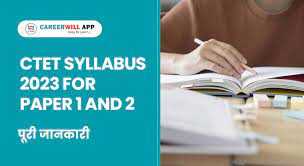The Central Teacher Eligibility Test (CTET) is a highly esteemed examination in India that assesses the eligibility of candidates aspiring to become teachers in government schools from classes I to VIII. Conducted by the Central Board of Secondary Education (CBSE), CTET aims to ensure that teachers possess the necessary skills and knowledge to impart quality education to students. To prepare effectively for CTET, it is crucial to understand the syllabus comprehensively. The CTET syllabus is designed to cover a wide range of topics and subjects to evaluate a candidate's teaching aptitude. This article will provide an overview of the CTET syllabus.

Child Development and Pedagogy:
This section assesses the candidate's understanding of child psychology, development stages, and educational theories. It includes concepts related to child-centered education, learning processes, and pedagogical issues.
Language I (Compulsory):
Candidates have to choose a language (English or Hindi) and answer questions related to language comprehension, vocabulary, grammar, and pedagogy of language teaching.
Language II (Compulsory):
Candidates select a different language from Language I and answer questions on language comprehension, vocabulary, grammar, and language pedagogy.
Mathematics:
For candidates aspiring to teach classes I to V, this section evaluates their knowledge of mathematical concepts, geometry, and pedagogical issues related to teaching mathematics. For those aspiring to teach classes VI to VIII, the syllabus extends to algebra, data handling, statistics, and their pedagogical aspects.
Environmental Studies:
This section assesses candidates' familiarity with environmental concepts, biodiversity, and their ability to integrate these into teaching. It is relevant for those aspiring to teach classes I to V.
Science:
Candidates aiming to teach classes VI to VIII need to focus on science topics. The syllabus includes subjects like physics, chemistry, biology, and their pedagogical aspects.
Social Studies/Social Science:
For candidates aspiring to teach classes VI to VIII, this section covers topics related to history, geography, civics, and economics, along with their pedagogical aspects.
Mathematics and Science (for Mathematics and Science Teachers):
This section is exclusively for candidates who wish to teach mathematics and science to classes VI to VIII. It includes detailed topics from both subjects and their pedagogy.
Social Science (for Social Science Teachers):
For those aiming to teach social science to classes VI to VIII, this section focuses on history, geography, civics, and economics, along with pedagogical aspects specific to these subjects.
It's essential for candidates to refer to the official CTET syllabus provided by CBSE, as it may undergo changes over time. Additionally, candidates should prepare thoroughly by referring to recommended textbooks and study materials to cover the syllabus comprehensively.
In conclusion, the CTET syllabus is designed to evaluate a candidate's proficiency in teaching various subjects and their understanding of child psychology and pedagogy. Candidates must prepare diligently, as qualifying the CTET is a significant step towards a rewarding career in teaching. Adequate preparation and a deep understanding of the syllabus will boost candidates' confidence and increase their chances of success in this competitive examination.






